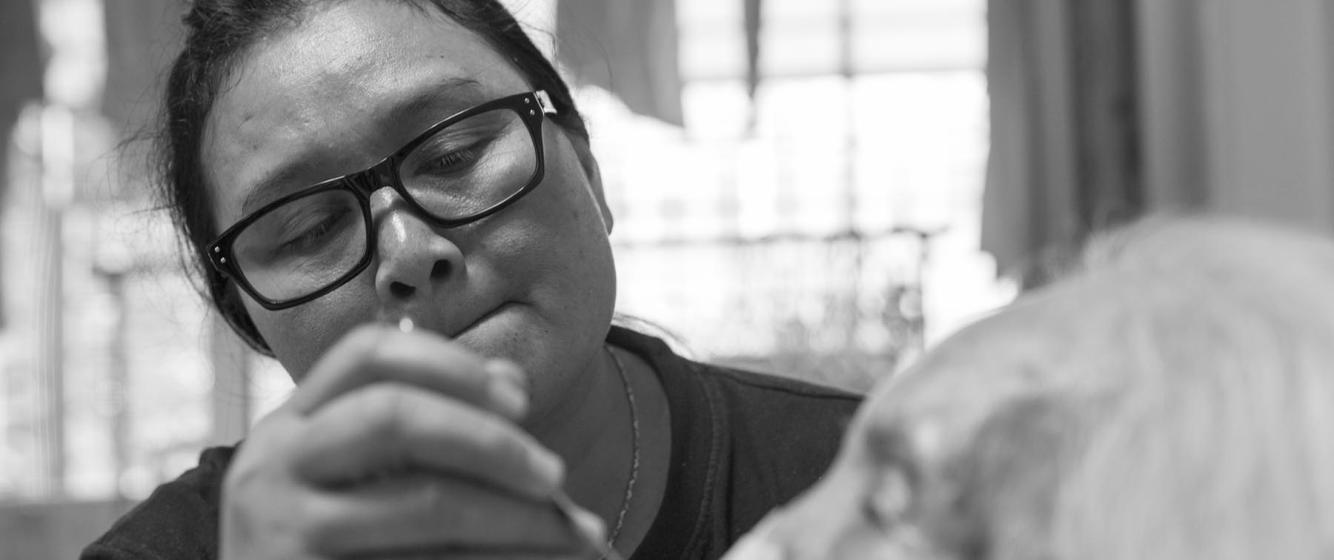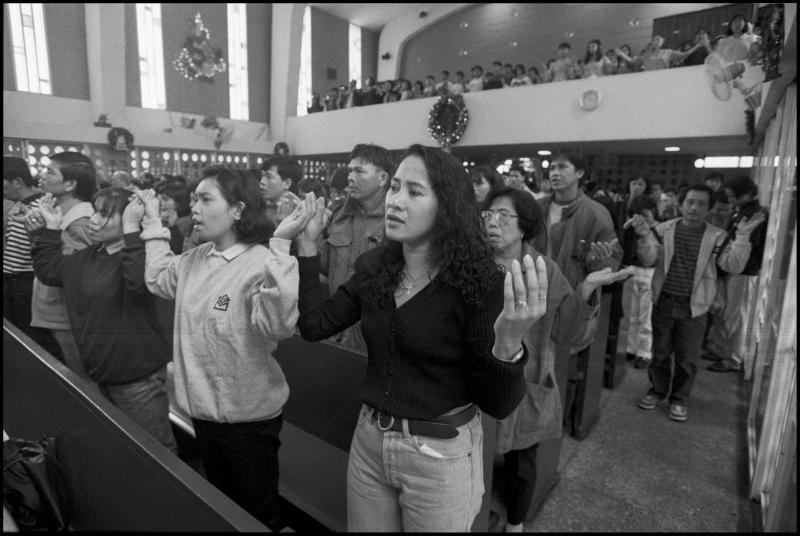
Fig. 1: Care worker with patient. (Photo courtesy of Tzu-ming Huang)
We Must Push Forward the Reform!
The following narrative was constructed by Isabelle Cockel, based on an interview that she conducted with June (pseudonym), a former Filipino care worker in Taiwan.
We were a poor family and I wanted to help my parents. I am my family’s breadwinner. I was their breadwinner when I was young. Now, I am still their breadwinner even after I have moved from the Philippines to Taiwan as a wife and a mother of two girls.
My departure from the Philippines began when I went to work in the Middle East. I was a domestic worker over there. My second overseas employment was in Hong Kong. In Hong Kong, my employer was good most of the time, but she once lost her temper at me and poured a pot of hot water over my feet. I would not let her hurt me – I locked myself in my room and called my broker. I told my broker if they did not come and get me out of there, I would bring the case to the court. My employer abused me and I did not deserve to be treated like this. The broker finally came and at the moment when I was about to leave the house, my employer wanted to check my luggage, making sure I did not steal anything from them. I might be just a domestic worker and she bought me things from time to time, but I am not a thief, and I did not deserve such humiliation. I said I would leave everything behind in their house and I did what I said – I took my passport and my residency document with me and walked out of their house with dignity as a free person. My third overseas employment was in Japan. I liked my job in Japan and wanted to return to Japan, but there was a problem. My name on my passport was wrongly spelled and that made it look like I used a forged passport. It became too complicated to solve this technical problem, so I gave up this idea.
I came to Taiwan instead in 2018. I was a carer looking after an elderly woman who had poor mental health. She hit me from time to time. I told my broker I did not want to work for this patient. I also told my friend about my difficulty. My friend contacted Self-Help (pseudonym), an organisation established by Filipino domestic workers. I also rang the government-funded hotline 1955 about the old woman’s abuse of me. I finally got out of this terrible employment and stayed at the broker’s place. They told me that they could find me a new employer if I paid them again for this service because it is me who broke the contract. I did not understand why I had to do that, so I asked Self-Help for advice. Self-Help told me not to give in, so I told the broker I would not pay them, and if they did not find me a new employment, I would sue them. Knowing that that there was nothing to be gained from me, the broker found me another employment – looking after an elderly man who suffered dementia.

_
Fig. 2: Worship during mass service at church. (Photo courtesy of Tzu-ming Huang)
Before I started this second caretaking job, I had a brief job looking after a woman who was at a terminal stage of cancer. I worked with her family for six months and only had two days off in those six months. She was a mother of two and spent a long time at hospital. We were both Christian and went to church together. We got along so well with each other that her family took me in like a family member. I was a daughter to my employer’s mother; I was a sister to my employer and her sister; I was a mother to my employer’s two children. Her husband physically abused her even when she was really sick and frail. When he beat her, I fought back to protect my sister! When she was at her last moment in this world, she was calling my name. She wanted to see me and asked me to promise that I would look after her two children like their mother. I could not make this promise to her, but her sister told her that I would be their daughter and their sister. I am still in touch with them. I am alone in Taiwan but they are my families. They came to my wedding and I brought my children to see them, too. In fact, when I visited them last year, they told me that they dreamed of me being a pregnant woman, even before I realised I was pregnant!
After my employer-sister passed away, I looked after an elderly man who was often confused because of his illness. It was very hard to look after a dementia patient whilst I was also asked to do all the housework. My days started early for cooking, cleaning, and laundry, and I also helped out with the employer’s car-washing business. At the same time, I had to look after my employer’s father who sometimes behaved like a child. He refused to wear nappies, so I had to clean up after him – it was everywhere on the floor. Afterwards, I had to clean him, too. If I showed my impatience to him, he would shout at me, telling me off, but after he calmed down, he would come to apologise to me. I told him if he did not like to wear nappies and could not deal with his need, he could tell me so I could help. Being confused, he also touched my body. In spite of his illness, I did not want to tolerate this sexual harassment. I told his son and my broker that this was unacceptable. They tried to make him understand that this was not to be tolerated.
After I had this employment, I joined Self-Help as a member. I wanted to help people who did not know their rights. Self-Help is part of an international coalition about migrant domestic workers, and it has local chapters in three major cities in Taiwan. It convenes its general meetings every month in Taipei. Self-Help also reaches out to the Indonesian community. We must work hard to push legal reform. It is not enough for us to rescue individuals. For example, we know that two Filipino workers were hired to be carers in central Taiwan, but they were also asked to work on the employers’ farms. As a legally registered organisation, Self-Help communicates with the Ministry of Labour (MoL) formally about our demands. For example, we asked to have a weekly holiday. We also organised street rallies and I participated in some of them. Self-Help plays a significant role in protecting Filipino workers because there is a limit as to what the government-funded hotline 1955 can do. I found that 1955 did not give its callers good advice and sometimes it gave no advice at all.
From being a member, I was elected to be a leader. Self-Help provides leadership seminars for us and it also organises seminars about specific issues to increase or update our knowledge and information. For example, there were eight sessions about pregnant workers’ rights and entitlements. By law, pregnant women are entitled to stay in Taiwan even if the contact was severed by their employers, but they have to report their residence to the Labour Bureau, as required by the Employment Service Act. These are granted by the Gender Equality in Employment Act. Their children can stay in Taiwan up to three months. I helped with a Filipino woman to send her child back home – she and her boyfriend could not return to the Philippines, so they asked a Taiwanese social worker to travel with their baby and deliver the baby to the woman’s family. It’s heart-breaking to see a mother separated from her new born baby. There are other complications if the baby’s father is Taiwanese. I found that factory workers are more likely to get pregnant than home-based carers. And abortion is taken as a solution to unintended pregnancies, but this is not good from my point of view. If I were asked for advice, I would dissuade people from getting pregnant in Taiwan. After all, the whole reason for us to come here is to work. We should stay focused on our goal.
As a leader of Self-Help, I was responsible for handling cases. Often, I received calls from our members about their grievance. Some of them needed to be rescued, like how Self-Help rescued me before. I would contact the police and went to visit the callers. I would not go by myself. I would then issue a formal communication to the Labour Bureau. I would be involved in the meditation between the broker and our member. In March 2023, I was assigned as a Self-Help representative to Indonesia to attend a training workshop about migrant workers’ rights. I enjoyed my work and I am very happy that I could help people who otherwise may not stand a chance to solve their problems. My religion has kept me strong. Although my husband and in-laws are not Christian, they respect my religion. They sometimes come with me to the church. Whenever I am low or depressed, my husband will say, “Go to talk to your God.” My in-laws have their own belief, and participating in their worship does not bother me. They respect my beliefs and I respect theirs. I am now a mother of two, so I have stepped down as a leader although I continue to be a member, as I want to keep up with what is happening within the community.
Add new comment